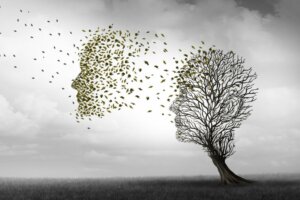The Ego - The Boastful Voice that Drowns Out Humility


Written and verified by the psychologist Valeria Sabater
What’s the ego? People often define it as a kind of social mask, made up of arrogance and defense mechanisms. It’s feeling proud that you climbed the mountain because you want everyone else to see you, not because it’s an opportunity to see the world from a different perspective. Very few psychological constructs have so many different and varied definitions.
The concept of the ego, a term that comes from the Latin word for “I”, is one of the aspects of personality that people talk about the most. The most common definition of ego is haughtiness or arrogance, a self-image that seeks to impose itself on other people. That being said, it’s still just another mental construct, an identity that you build with your internal factory that’s churning out ideas, experiences, emotions, and needs.
Your authentic self lies behind this artifice of self, behind the external mask. The problem arises when you’re overly dependent on and attached to the external layer that you’ve created to survive harsh reality. Let’s delve a little deeper, shall we?

Five ways to better understand this psychological construct
If you’re wondering about the ego, it’s important to first realize that this is one of the most complex constructs in psychology. Within psychology, many concepts use the prefix “ego”. There’s egotism, the egoic mind, egocentrism, or even ego defense mechanisms.
The school of thought that developed this concept the most was the psychodynamic school. Specifically, Sigmund Freud. However, it’s worth noting that Eastern philosophy has been studying these ideas for centuries. So much so that anyone who delves deep into the study of Buddhism will find that the central theme is related to the ego.
Philosophy and the concept of the ego
In his book, The Critique of Judgment, Immanuel Kant explained that the ego collects every construct and mental representation that the individual carries out. Jean Paul-Sartre, for his part, had a very similar conception of the ego.
Sigmund Freud’s legacy
As we mentioned above, the school of thought that made the greatest contribution to ideas and conceptions of this construct was Sigmund Freud’s. This father of psychoanalysis believed that human beings are subjected to three counter-opposing forces that determine how they act and respond to the world. These forces are the ego, the id, and the super id.
Freud argued that the ego is the representation you make of the world around you. Likewise, it’s the entity that tries to control your impulses and basic instincts. In essence, it tries to satisfy your desires in a socially-acceptable way.
The spiritual, mystic, and Buddhist perspective on the ego
Buddhists have studied the ego in-depth. However, existential philosophical perspectives are very different from psychodynamic psychological ones:
- Buddhists believe that the ego is an incorrect conception of the self. It comes to you at birth and integrates your image, identity, nationality, passions, culture, education, and beliefs. However, this set of dimensions are nothing more than superficial constructs. We become attached to these processes, but because they’re oriented externally, they hide your authenticity.
- The ego is a false identity that brings suffering because it subjects you to whatever you lack.
- One modern author who has written a lot about the ego is Eckhart Tolle. He believes that the ego causes suffering. Tolle believed that people are overly attached to their thoughts, fears, needs, and desires. We’re also too attached to the urban legends and myths that lead you to create a false version of yourself.

The ego from a psychological perspective
Portuguese writer Fernando Pessoa very aptly said, “I look, and things exist. I think, and I only I exist”. The psychological construct that is the ego is a part of you that you’ve built to move around in the social world. This means that it’s possible to have a healthy ego.
The opposite, then, is also true. You might be co-existing with a psychological entity that’s desperately trying to feed off the external world, desperately seeing recognition and attention. Let’s take a closer look.
The effects of a distorted ego
This makes you feel as if you’re constantly lacking something. This reflects a mind obsessed with knowing what others think. This is the kind of gaze that looks out into the world with fear. It’s being afraid to fail, not being loved, disappointing your parents, and having fewer money than others, etc.
Those types of fears lead you to develop defense mechanisms such as pride and arrogance. Those masks, as we mentioned earlier, protect your inner weaknesses.
A sick ego is the reflection of low self-esteem, of someone who hasn’t worked on their own identity.
A healthy ego
So is it possible to have a healthy ego? The short answer is yes. A healthy ego allows you to have a meaningful life because it helps you be in harmony with what you are. We’re also able to show that (with what we need and offer) without becoming attached to the other world.
- It helps you understand that everyone deserves respect, that no one is better than anyone else, and that satisfaction stems from tolerance and self-care.
- Balance comes from good self-esteem, a bridge between your inner and outer selves. It helps you recognize the value of life and give it meaning.
- When you find inner meaning, any external sense that you’re missing something will disappear. That’s where the true well-being revolution begins.
Although all the definitions of ego many confuse you, you need to remember that isn’t either good or bad. It’s part of you, a subjective concept that you build yourself. If you set your mind to it, you can transform your ego.
All cited sources were thoroughly reviewed by our team to ensure their quality, reliability, currency, and validity. The bibliography of this article was considered reliable and of academic or scientific accuracy.
- Ekhart, Tolle (2017) Un nuevo mundo ahora. De bolsillo
- Schirrmacher, Frank (2010) Ego. Editorial Ariel
- Freud, Sigmund (2012) El yo y el ello y otros ensayos de metapsicología. Alianza
- Plata, Oswaldo. (2011). El yo, el otro-yo y el otro en Kant. De la fundamentación de la metafísica de las costumbres a la religión dentro de los límites de la razón. Praxis Filosófica. 10.25100/pfilosofica.v0i19.3220.
This text is provided for informational purposes only and does not replace consultation with a professional. If in doubt, consult your specialist.








